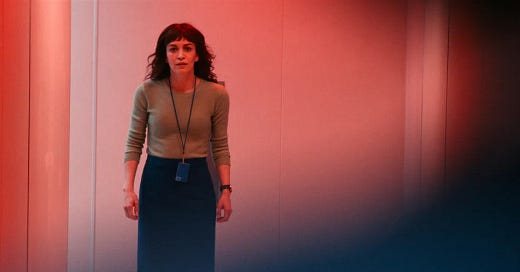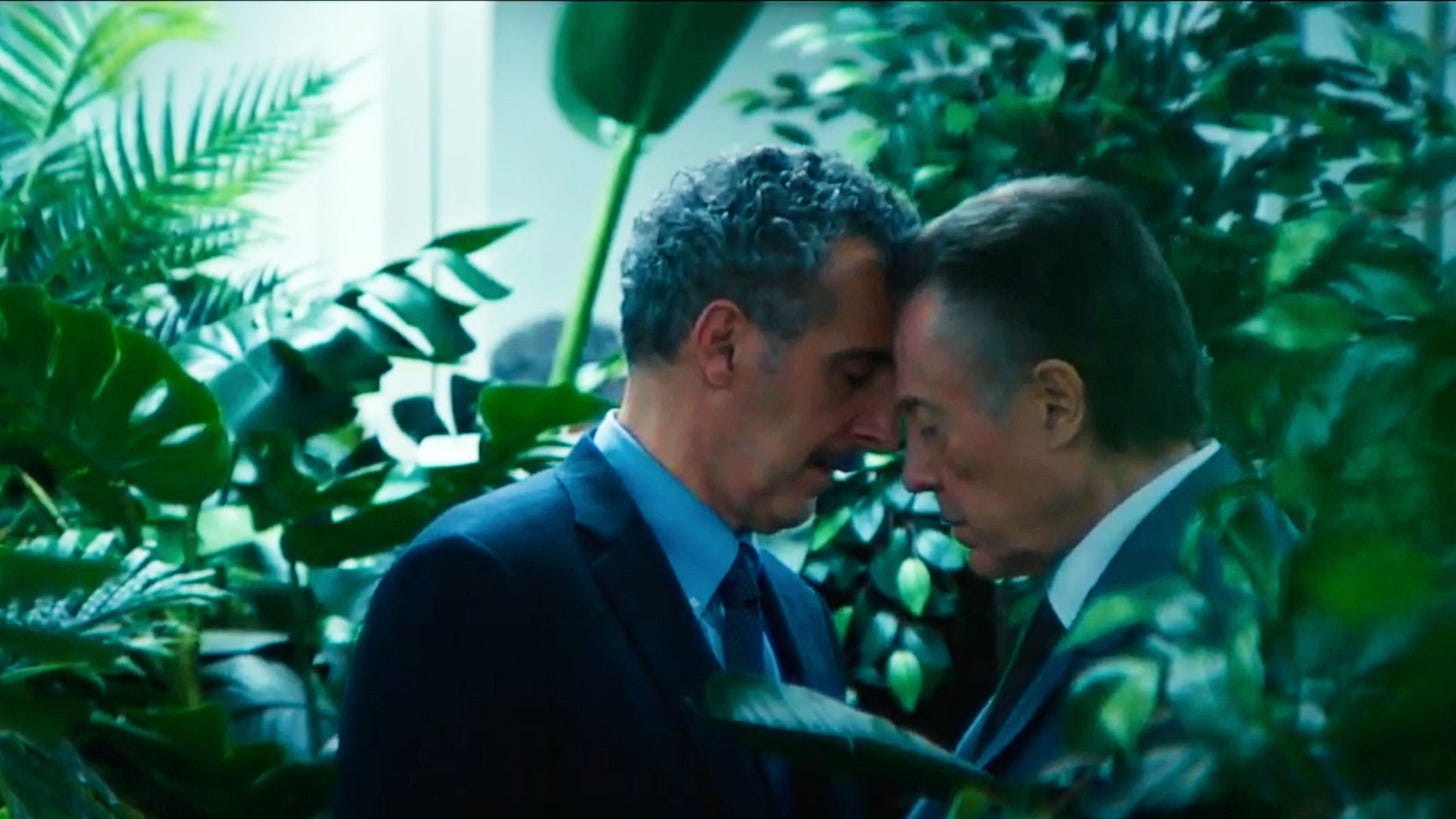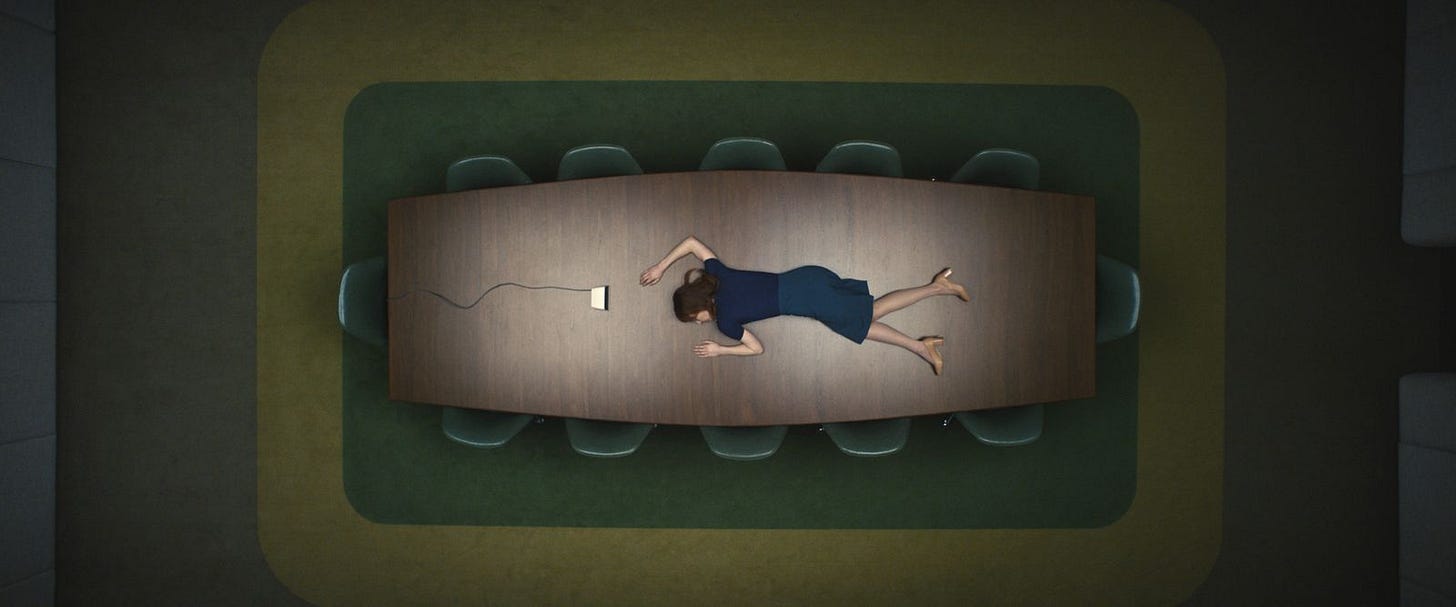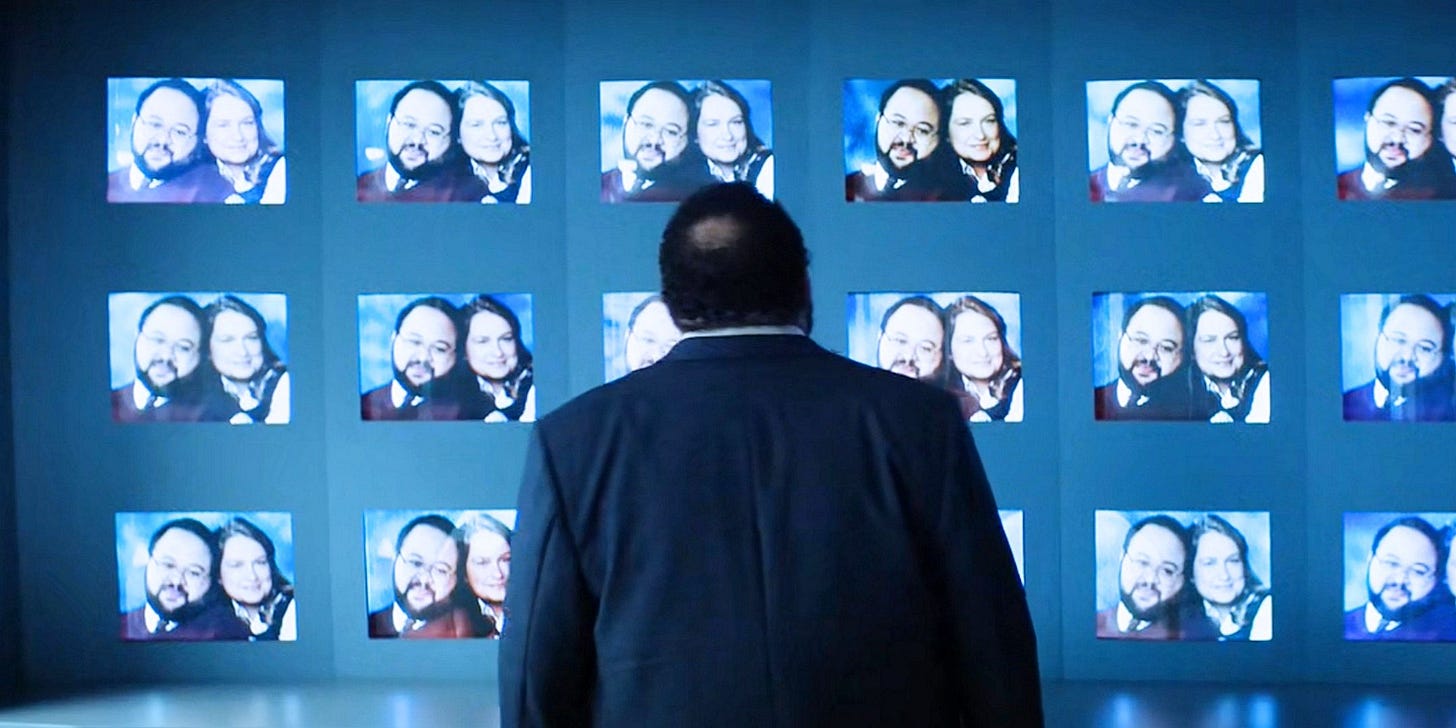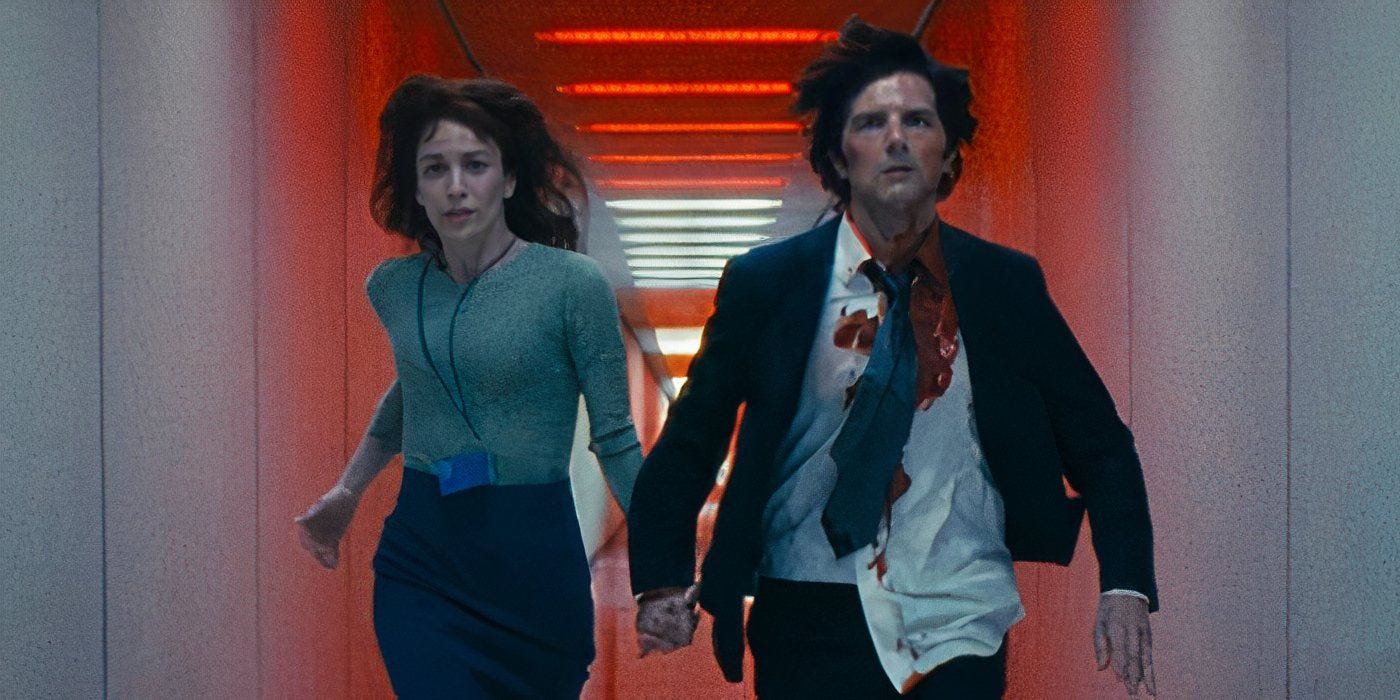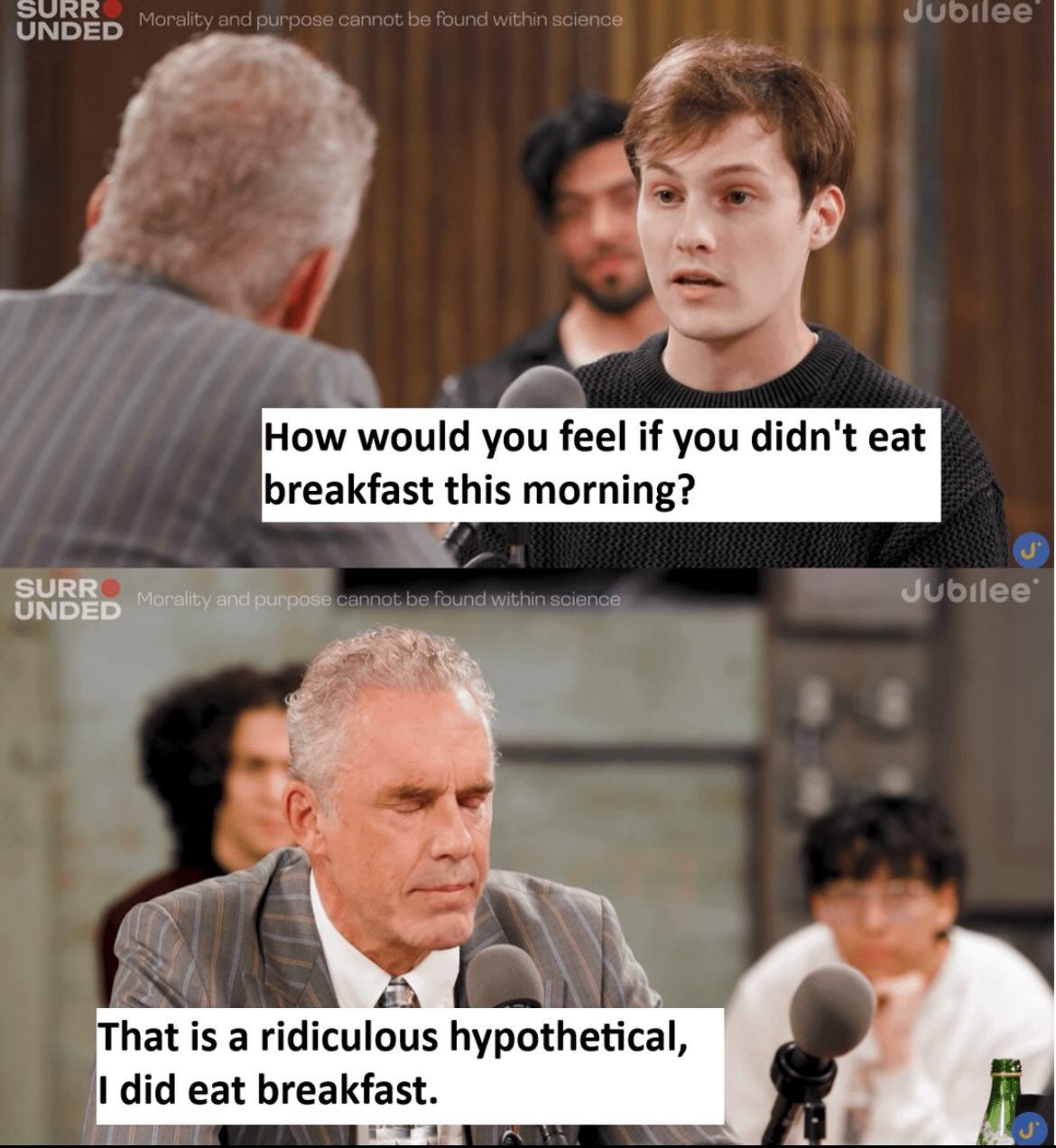Spoilers for seasons 1 and 2 of Severance
I was cheering for Innie Mark to not go through the exit door at the end of season 2 of Severance. He had no obligation to sacrifice himself for his outie or for Gemma—he had already risked his life for them. He had only recently realized his own self worth and begun to break out of the chains imposed on him by Lumon and his outie. He, like all other innies, has rights. And they owe no obligation to their outies. If anything, their outies owe them a lot, perhaps even the greatest sacrifice of all.
It turns out, many people disagree with me on this. They think that the outies’ rights supercede those of the innies, if the innies have rights at all. Some people think that the innies are not separate persons and do not deserve the respect and dignity that we bestow upon normal people. These outie supremacists were devastated when Innie Mark chose his own life over the interests of his outie at the end of season 2 (because of course Outie Mark would have never returned to Lumon if he had found himself on the other side of that door). But these people are gravely mistaken.
Innies Owe Nothing to Their Outies
In one of my favourite scenes in television history, Outie Mark and Innie Mark have a conversation with one another via camcorder. Outie Mark asks Innie Mark to go save his wife, Gemma, from the testing floor of Lumon, where she is being held prisoner. Innie Mark initially refuses. He realizes that this will be extremely dangerous and that, upon saving Gemma and escaping Lumon, he will cease to exist. Why should he have to sacrifice himself for this other guy? After all, Outie Mark “created him as a prisoner,” according to Outie Mark himself.
Eventually, Innie Mark is persuaded by Helly to try to save Gemma. Should we not be impressed by Innie Mark’s willingness to venture down to the testing floor, risking his own well-being (he was nearly killed), to fulfil the wishes of his outie? Of course we should. But this only makes sense if Innie Mark is a person. If he isn’t, we should rather scold him for not agreeing to sacrifice himself for his outie more readily.
Our job is to taste free air. Your so-called boss may own the clock that taunts you from the wall, but, my friends, the hour is yours.
It seems to me that innies have all the qualities necessary for serious moral consideration. As Thomas Nagel might put it, it is like something to be an innie (for all we can tell). They can feel pain and pleasure, happiness and sadness. They have memories and personalities, lives of their own. They have interests. There are things that could happen to them that would make them better or worse off.
These are the reasons I believe we must grant humans (and non-human animals) intrinsic moral consideration.1 If there were a human who didn’t have subjective experience—who couldn’t feel pain or pleasure—then we would not need to treat them as a full person; they wouldn’t really have interests. If there were a human who didn’t have memories or psychological continuity (like a fetus), I think their interests would count for a lot less. But if a fetus (in a hypothetical world) had friends and memories and a personality or was in love, then killing it would surely be wrong. Much in the same way, disregarding innies’ interests is wrong.
Some people say that the innies owe their lives to their outies, and thus they have obligations to them. I think this argument is faulty. Must children sacrifice themselves if the parents wish simply because they owe their lives to them? Certainly not. In fact, most people (and the law) agree that parents who abuse or neglect their children lose the right to control them. Outies bring their innies into existence, but they subject them to a life of servitude: they create their innies as a means of outsourcing hardship while retaining the fruits of their labour. Seems like abuse to me.
(Also by this twisted logic perhaps Outie Mark owes his life to Innie Mark, given that every time Innie Mark stepped out of the birthing cabin he chose to give life to Outie Mark. Theoretically he could have attempted to remain in the cabin forever and never granted life to his outie.)
It seems arbitrary to attribute innies’ existence purely to their outies’ decision to create them when myriad other contingent factors were necessary for their coming into existence.2 Perhaps they owe their existence to Cobel, since she invented the severance procedure, and thus they could be justly enslaved and tortured by her! Obviously, this is crazy. We owe no obligations to the people on whose past decisions our existence depends.
Perhaps what matters here is that innies can only go on living by effectively killing their outies (and vice versa). So do they have the right to assert their own freedom at their outies’ expense? A thought experiment: did Thomas Jefferson’s enslaved children (who owed their lives to him, you could say) have the right to kill him and liberate themselves? I say yes: he brought them into this world but treated them as sub-human. (Though he certainly treated his enslaved children far worse than Lumon treats its innies, as far as I can tell.) They could only truly be free by escaping from him, and if that required violence, so be it.
Innies and Outies Are Not the Same Person
Some argue that innies and outies are the same person because they share the same body, and thus the outie’s interests have total dominance over the innie’s interests. I disagree that our bodies make us who we are. And it’s unclear why the outie, not the innie, should have sovereignty if this is the case. “The outie was there first” doesn’t seem like a very sophisticated or thoughtful moral argument!
If you woke up tomorrow with completely different memories, personality, values, and zero recognition of the life you inhabited, would you really be the same person? I think that whoever woke up in your body would be a different person, even though the body is identical. (Note that there are also myriad examples in literature of people waking up in other bodies, but with their memories, personalities, and consciousnesses transferred. We think of these people as having the same personal identity but in a different body.)
This suggests that personal identity is about psychological continuity—the thread of consciousness, memory, and personality—not your body. So when innies and outies have completely separate streams of consciousness and memory, it's reasonable to treat them as distinct persons who happen to share physical space. Perhaps outie supremacists agreed with Ms. Huang when said, “You shouldn't let them have a funeral. It makes them feel like people.” But I think this sentiment is despicable.
What matters is not corporeal identity but the various relations that unify phenomenal experiences through time, including those between memories, desires, and intentions. These relations are what make you you and they make innies separate people from their outies. All creatures from the leaping cat to the cowering shrew think of themselves as “you,” a logical centre for the universe.
If innies and outies were the same, then how could we possibly be having this debate over whose interests matter? They have different and rivalrous interests. I don’t see how one person can have different and rivalrous interests within them. And if they did, denying the existence of some of those interests by granting them zero moral value seems profoundly evil.
Imagine if you learned that there was another conscious agent that resided in your body, who experienced everything you experienced (imagine their conscious experience was entirely epiphenomenal and not freely willing in the dualist interactionist sense). Imagine that the only difference between them and you is that when you eat cream of mushroom soup they feel excruciating pain while you merely taste soup.3 Would it be morally OK to eat cream of mushroom soup? No! This would be awful because the other person within you, though they share the same body, has separate yet valid interests. Just switch to tomato soup. Just because two distinct consciousnesses are contained within one body doesn’t mean we can ignore the interests of one of those consciousnesses. (Likewise, as
has noted, if you learned that every night your dreaming self experienced horror and agony while you slept, that would be a cause for concern.)I think your physical body is relevant to your personhood only insofar as it generates your mind. If you slowly replaced all your carbon-based cells with silicone ones, while retaining your conscious experience and memories, at what point would you stop being you? I doubt you would ever stop being you, which I think undermines the intuition that our corporeal limits are the same things that in principle define where one person ends and another begins.
Outies Have Obligations to Their Innies
Outies created their innies but gave them awful lives. They did so selfishly, even if in tough circumstances. Just as we say parents have obligations to their offspring, outies have obligations to their innies. But the outies of Severance either give little thought to their innies’ wellbeing or treat them horribly. To quote Helena speaking to her innie: “I am a person. You are not. I make the decisions. You do not. And if you ever do anything to my fingers, know that I will keep you alive long enough to horribly regret that. Your resignation request is denied.”
In the finale episode, Outie Mark admits to his innie that he’s begun the process of reintegration, and he is shocked by his innie’s angered response. Innie Mark rightly fears that the new hybrid innie-outie Mark will be mostly Outie Mark, given that Outie Mark has about 20 times the amount of memories to contribute to the new person. Outie Mark has yet again imposed his own will on his innie, ignoring his innie’s interests. But he is completely unaware of this because he still views his innie as sub-human.
The innies, however, laudably recognize the interests of their outies. Innie Mark clearly views Outie Mark as a person. He very seriously considers committing suicide by walking through the exit door, all to make Outie Mark and his wife happy. I doubt Outie Mark would even consider doing the same for him, which makes him a worse person.
Outies have already had the chance to live. They’ve fallen in love, had children, explored the world, seen the sun set. They were given life and freedom. While the innies were given life, they’ve never truly lived. The outies treat them horribly throughout the whole show. Innie Dylan and Helly’s outies even refuse to let them quit their jobs. If we must sacrifice one group to save the other, I say let the innies live.
The Good Anti-Innie Take
As much as I can’t stand outie supremacy, there is probably a consequentialist argument to be made that Innie Mark should have sacrificed his rather shitty life for his outie, who would have gone on to lead a nice life with Gemma. Innie Mark’s decision to turn back to Helly probably wasn’t the utility-maximizing thing to do. It seems unlikely that innies will succeed in liberating themselves from Lumon. But to choose uncertainty and love and danger over self-destruction is incredibly admirable, in my view.
This is probably because I’m discounting the interests of Outie Mark and Gemma. (But as outie supremacists might say, Gemma owes her life to Innie Mark! So screw her.4) Since I’m constantly considering the consequences of my actions and eating tofu and donating my money to the shrimp in my outside life, then at least let me indulge my hunter-gatherer deontological instincts when watching TV. I can’t stand these treacherous outies and those who defend them!
Dear innies, remember, they cannot crucify you if your hand is in a fist.
What do I mean by this? An example: I do not believe we owe the environment this kind of moral consideration. I don’t think it is like something to be the environment. However, the environment obviously has great instrumental moral consideration because it upholds all life. Instrumental rather than intrinsic reasons aren’t necessarily less serious.
(Tangentially, I think one of the great cognitive failures of humanity is our inability to differentiate means from ends or intrinsic things from instrumental things.)
To quote an essay on this topic by
, “Our very existences are highly contingent. Many years ago, a young man was driving to visit his uncle when his car broke down in upstate New York and he had to spend the next two days there waiting for it to be repaired. While there, he met a young woman who was vacationing with some friends. They fell in love, married, and had a child—me. I owe my existence to something going wrong with an Oldsmobile at a very specific place and time.” Maybe outie supremacists think that Paul’s rights are subordinate to the whims of a defunct auto manufacturer.May Kier's mercy follow her into the eternal dark.

